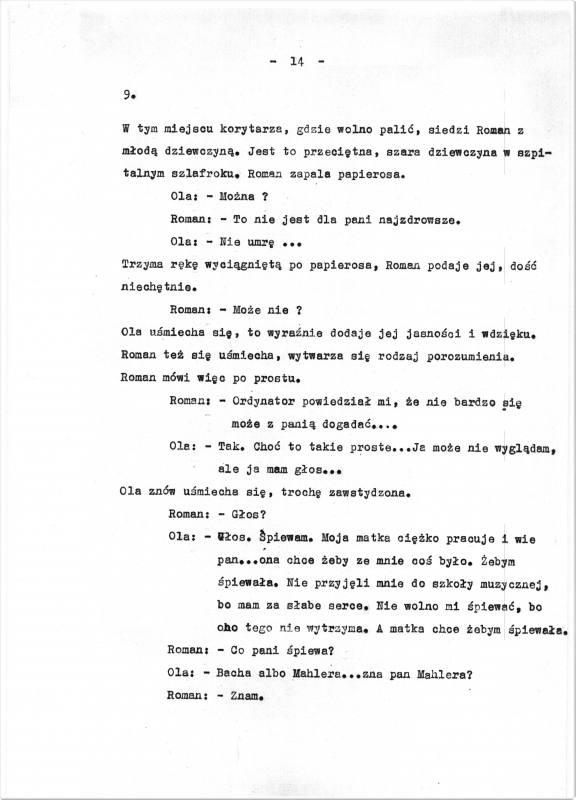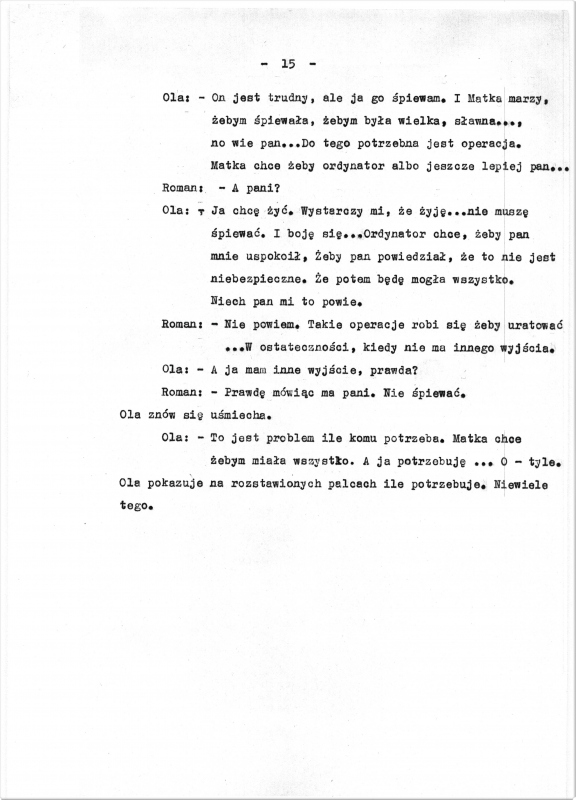Bródno Hospital
Located in the Warsaw neighborhood of Targówek, the Bródno Hospital complex comprises twelve buildings. It was officially opened on January 22, 1981.
Decalogue Nine
Roman (Piotr Machalica), a cardiac surgeon, meets a young singer, Ola (Jolanta Piętek), who is in the hospital awaiting heart surgery. Her ability to sing hinges on the success of the procedure. The pursuit of a vocal career is more her mother’s ambition than her own, but after the operation Ola changes her outlook on life, discovering a desire to sing and be heard. Kieślowski explores the theme of a talented singer suffering from a heart condition in greater depth in his film The Double Life of Veronique. Both films feature the voice of the same singer, Elżbieta Towarnicka. Ola sings to music composed by Van den Budenmayer, whose work is also heard in the movie about two Veroniques and in Three Colours: Blue. The eighteenth-century Dutch composer is a fictional character; his name is an artistic pseudonym used by by Zbigniew Preisner, who wrote the music to The Decalogue, and authored the scores to the Polish director’s later films. The collaboration between Kieślowski, Preisner, and Piesiewicz began with the film No End and continued until the filmmaker’s death. In 1998 Preisner composed Requiem for my Friend, dedicating the piece to the memory of Krzysztof Kieślowski. The trope of an artist struggling with various limitations—for example, the story of the young singer in Decalogue Nine—appears in some of Kieślowski’s earlier films: the documentary Seven Women of Different Ages and the feature Camera Buff.
Mikołaj Jazdon
“The sign of a double life”
Betrayed by his body and wife, racked with pain, the Husband mutters parts of Archimedes’ principle: “A body immersed [in the depths of grief…], loses…”; his wife, sensing and understanding his intention, adds: “appears to lose…”. Kieślowski asks the question: is this loss merely an illusion? Marital infidelity is a recurrent theme in the series. It was the driving force in Decalogue Two (about tempting God and fate), in the third film (about the challenges of celebrating Christmas while in love), it lurked under the secret of uncertain fatherhood in the fourth episode, and was conspicuously absent from the film about the sixth commandment, “You shall not commit adultery.” In the sixth episode, the director instead addresses the problem of free love, love as such.
The Husband feels as if he has lost his relationship with his Wife; she desperately attempts to turn things around. At the same time, the Husband, fascinated by the vocal talents of his young patient, become something of a “demiurge” to her. Using his surgical abilities, he liberates the Girl from the shackles of the mediocrity she has herself chosen, letting her soar to hitherto unwanted heights of artistic mastery. She senses this impulse, even though she professes to hate him for the miracle. The desert of the Husband’s personal fiasco suddenly rings with the sounds of Van Den Budenmayer (Zbigniew Preisner’s cinematic alter ego). The girl anticipates, in Decalogue Nine, the secret behind the dual fortunes of the main characters in the film The Double Life of Veronique. The Husband, meanwhile, experiences this duality “here and now.” It is apparent that his fascination with the melody (is it just that?) doesn’t extend to his Wife. He now bears the mark of a “double life,” as his Wife did before him. We all bear the marks of trespassing against our neighbors and reconciliation. And that is what the ninth Word of God is about.

